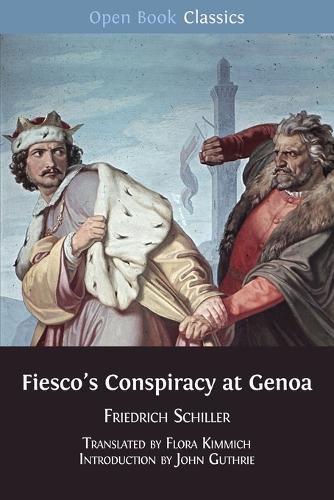Readings Newsletter
Become a Readings Member to make your shopping experience even easier.
Sign in or sign up for free!
You’re not far away from qualifying for FREE standard shipping within Australia
You’ve qualified for FREE standard shipping within Australia
The cart is loading…






This title is printed to order. This book may have been self-published. If so, we cannot guarantee the quality of the content. In the main most books will have gone through the editing process however some may not. We therefore suggest that you be aware of this before ordering this book. If in doubt check either the author or publisher’s details as we are unable to accept any returns unless they are faulty. Please contact us if you have any questions.
Within two years of the success of his first play Die Rauber on the German stage in 1781, Schiller wrote a drama based on a rebellion in sixteenth century Italy, its title: The Conspiracy of Fiesco at Genoa. A Republican Tragedy. At the head of the conspiracy stood Gian Luigi de’ Fieschi (1524-1547), Schiller’s Count Fiesco, a clever, courageous and charismatic figure, an epicurean and unhesitant egoist, politically ambitious, but unsure of his aims and principles. He is one of Schiller’s mysterious, protean characters who secures both our admiration and disgust. With Fiesco as tragic hero Schiller examines the complex entanglement of morality and politics in his own times that was to preoccupy him throughout his career. The play was a moderate success when performed in Mannheim in 1784; it was more popular in Berlin, where during Schiller’s lifetime, it was performed many times in a version by Carl Plumicke, which however radically altered the play’s meaning. There have been some noteworthy productions on the German stage and television, even if it has remained somewhat in the shadow of Schiller’ other works. In the English-speaking world it is all but unknown and very seldom performed. This translation aims to remedy that oversight.
$9.00 standard shipping within Australia
FREE standard shipping within Australia for orders over $100.00
Express & International shipping calculated at checkout
This title is printed to order. This book may have been self-published. If so, we cannot guarantee the quality of the content. In the main most books will have gone through the editing process however some may not. We therefore suggest that you be aware of this before ordering this book. If in doubt check either the author or publisher’s details as we are unable to accept any returns unless they are faulty. Please contact us if you have any questions.
Within two years of the success of his first play Die Rauber on the German stage in 1781, Schiller wrote a drama based on a rebellion in sixteenth century Italy, its title: The Conspiracy of Fiesco at Genoa. A Republican Tragedy. At the head of the conspiracy stood Gian Luigi de’ Fieschi (1524-1547), Schiller’s Count Fiesco, a clever, courageous and charismatic figure, an epicurean and unhesitant egoist, politically ambitious, but unsure of his aims and principles. He is one of Schiller’s mysterious, protean characters who secures both our admiration and disgust. With Fiesco as tragic hero Schiller examines the complex entanglement of morality and politics in his own times that was to preoccupy him throughout his career. The play was a moderate success when performed in Mannheim in 1784; it was more popular in Berlin, where during Schiller’s lifetime, it was performed many times in a version by Carl Plumicke, which however radically altered the play’s meaning. There have been some noteworthy productions on the German stage and television, even if it has remained somewhat in the shadow of Schiller’ other works. In the English-speaking world it is all but unknown and very seldom performed. This translation aims to remedy that oversight.